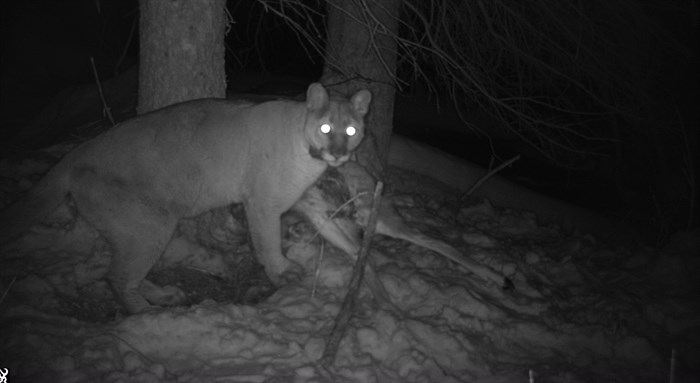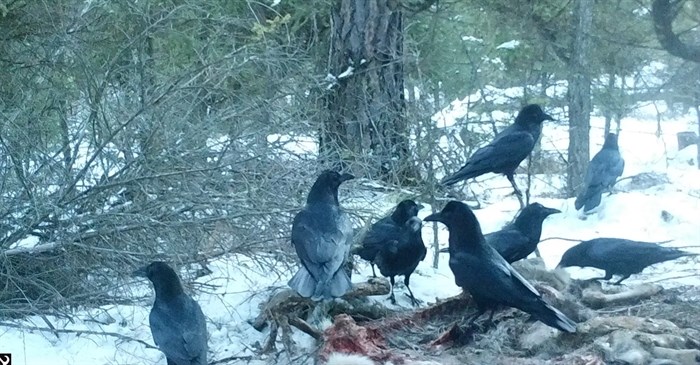
Cougar eating its prey
Image Credit: SUBMITTED/ Ashley Giovannini and Siobhan Darlington
October 12, 2024 - 11:30 AM
A pair of UBC Okanagan students are set to publish an academic article about the relationship between cougars, carrion and birds.
Currently, not much information has been researched or published regarding the interactions between birds as they scavenge the carrion cougars leave behind. The article will be one of the few in North America to touch on this subject and is focused in Southern BC.
Head of the Southern BC Cougar Project and Ph.D candidate at UBCO, Siobhan Darlington, along with recent UBCO graduate and honours student, Ashley Giovannini, worked hand in hand to gain more knowledge about how birds interact with cougars, the carrion left behind by cougars and how this impacts the environmental codependency.
“A lot of the literature and what we know about these systems is focused on mammalian scavenging or communities overall, but not looking at the actual interactions between these birds and who is out competing who for access to these resources,” Darlington said.
While an abundance of information about bears, cougars and wolves as predators is available, there's a lack of understanding about birds in the ecosystem and how they interact with predator animals as scavengers.
The article still needs to be peer reviewed before publication.
Darlington is looking at cougars as a general part of this project, while Giovannini is looking closely at the birds involved.
Darlington, Giovannini and others have marked cougars to track their movements. The tracking was through telemetry and GPS collars so the research team can see the kills cougars have made and how long the animals stay in the area.
Once the cougars left, the team then hiked to the kill spots and set up cameras to watch the animals that would find the residue carrion and observe the interactions between birds that find the carcass.
“Cougars are called ecosystem engineers,” Darlington said. “They provide food for a large diversity of species on the landscape. They don't eat all the food that they kill. A lot of animals come in and they benefit from the food that cougars provide."
In North America the majority of birds are scavenge when they need to, they don't have to scavenge constantly because it's not their only food source for survival.
“There's not a lot to explain why exactly they're deciding to go to carrion when they do have other foods that they could be eating, so I thought it was super cool to bring to light some more information on that,” Giovannini said.

Birds eating the carrion left behind by cougars
Image Credit: SUBMITTED/ Ashley Giovannini and Siobhan Darlington
According to the researchers, as cougars kill their prey, often a deer or moose, they do not always eat the entire animal after the kill. They cover up the remains with dirt and leaves, and leave the kill behind, which is when birds can find the meat and eat.
After the cougar kills its prey and leaves the area, birds will show up to feed on the carrion. Only on some occasions have the birds been brave enough to feed from the carrion when the cougar is still present.
Three factors observed and noted focus on environmental factors, like terrain ruggedness and temperature, the size of the kill and if the presence of other birds would influence more birds to join the feast or deter them.
Six main species of bird showed up to eat the carrion, which included ravens, turkey vultures, bald eagles, golden eagles, magpies and Canada jays. Others occasionally were present, but typically the main six routinely showed up.
The researchers found that if a raven showed up to a carcass, other birds would shortly follow. Although ravens don't rely on other animals hunting for them, they seem to notice when there's sustenance available and ready.
“Cougars are supplying something that's good to the community of animals and they're taking advantage of it when it becomes available,” Giovannini said.
They are still looking into why birds feed from the carrion if they don't depend on it and can find food sources elsewhere.
The research has made big steps for understanding of how cougars can affect other animals in the ecosystem, but this is only the tip of the iceberg, the researchers said.
Find out more about the Southern BC Cougar Project here.
To contact a reporter for this story, email Bailey Zimmer or call 250-808-0143 or email the editor. You can also submit photos, videos or news tips to the newsroom and be entered to win a monthly prize draw.
We welcome your comments and opinions on our stories but play nice. We won't censor or delete comments unless they contain off-topic statements or links, unnecessary vulgarity, false facts, spam or obviously fake profiles. If you have any concerns about what you see in comments, email the editor in the link above. SUBSCRIBE to our awesome newsletter here.
News from © iNFOnews, 2024